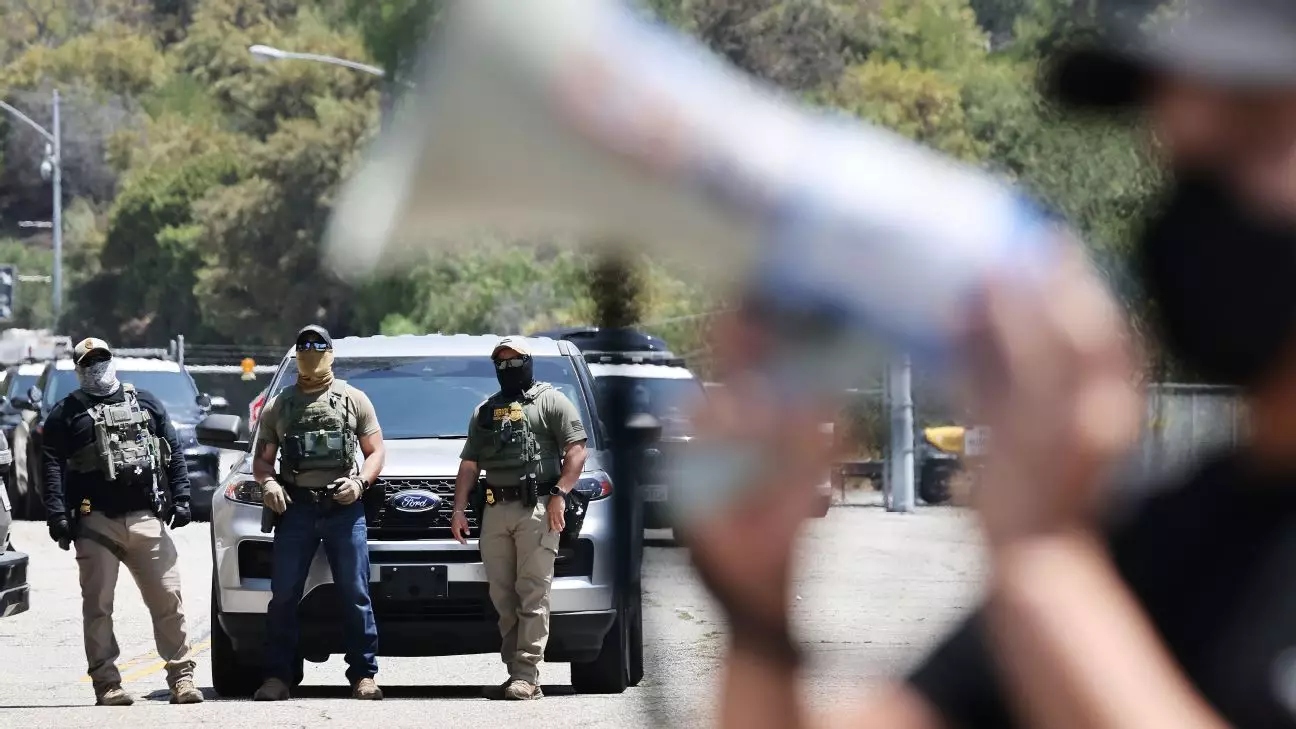Resilience Amidst Division: The Dodger Stadium Incident and Its Implications for Immigration Advocacy
There’s something uniquely captivating about a bustling city coming to life at dawn. On what seemed like an ordinary Thursday morning in Los Angeles, the sun cast its golden rays over Dodger Stadium. However, rather than the usual anticipation of a baseball game, the atmosphere was charged with tension and uncertainty. A line of unmarked vans and SUVs had parked outside, signaling a federal operation that would soon become the talk of the town and beyond.
Federal agents from the Department of Homeland Security (DHS) were stationed there in an unexpected move that sparked immediate backlash. As news spread across social media, protests erupted against this stark reminder of immigration enforcement. It seemed incongruous that such an event would unfold outside a family-friendly venue like Dodger Stadium, yet it underscored a growing divide in our nation. Questions arose: What were the intentions behind such federal actions? And what does this mean for community wellbeing?
Key Takeaways
- The Dodger Stadium incident highlighted tensions between federal immigration policies and community wellbeing.
- The Dodgers postponed their immigrant support initiative due to federal actions, facing challenges in advocacy efforts.
- Misinformation regarding agency identity fueled public outrage and confusion.
- Ongoing protests reflect deep dissatisfaction with current immigration enforcement practices.
The Dodgers’ Response: Intentions Complicated by Circumstances
Amidst the unfolding drama, the Dodgers faced their own dilemma. They had planned to announce a new initiative aimed at supporting immigrant communities, but circumstances forced them to postpone it. This wasn’t merely an inconvenience; it was a stark reminder of how even sports teams must navigate complex socio-political waters. Dodgers president Stan Kasten addressed this by acknowledging their commitment to continue working with involved groups despite the day’s events.
This situation prompts us to consider the power dynamics at play. As a cultural institution, Major League Baseball holds significant influence. When organizations like the Dodgers take a stand for immigrant rights, it can spark widespread activism and solidarity. Yet when thwarted by federal enforcement realities, it can also foster disillusionment among marginalized communities yearning for support and recognition.
Misinformation and Miscommunication
A major point of contention arose from miscommunication about which federal agency was present at Dodger Stadium. Initially, public outrage targeted U.S. Immigration and Customs Enforcement (ICE), known for its aggressive tactics. However, it was later clarified that the agents belonged to U.S. Customs and Border Protection (CBP). Though both are under DHS, each has distinct roles and reputations that affect public perception differently.
This incident underscores how misinformation can skew public understanding and lead to misplaced anger or fear. It’s crucial for communication lines to remain open and accurate, as trust hinges on having clear and truthful information. When misunderstandings occur on such a large scale, they hinder constructive discourse and exacerbate existing tensions within communities.
Community Reflection: Protests and Political Climate
The events at Dodger Stadium were not isolated but part of a broader narrative reflecting growing dissatisfaction with federal immigration policies. Los Angeles residents have been vocal through ongoing protests that sometimes escalate into confrontations with police. These actions highlight deep-seated frustrations with policies perceived as oppressive and unjust. They also serve as poignant reminders of how far communities are willing to go to protect their rights and ensure safety for vulnerable populations.
This vibrant form of activism marks a critical juncture where citizens are determined to challenge the status quo in pursuit of change. While efforts by organizations like the Dodgers to engage in advocacy are commendable, they also illustrate how quickly progress can be stalled by systemic barriers rooted in fear or ignorance. Such incidents remind us of the importance of resilience amid adversity and division.
Final Thoughts
As we reflect on these events, it’s clear that Los Angeles stands as both a beacon of diversity and a battleground for immigrant rights advocacy. The Dodger Stadium incident highlights not only human resilience but also the burdens imposed by political landscapes indifferent to community needs. It’s imperative that we renew our commitment to advocacy and engagement in pursuit of justice and unity for all.
immigration policy
community activism
Dodger Stadium incident
federal enforcement


Leave a Reply